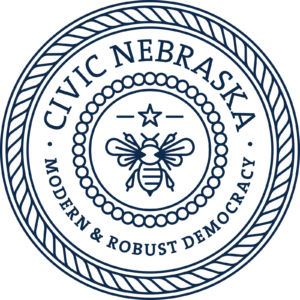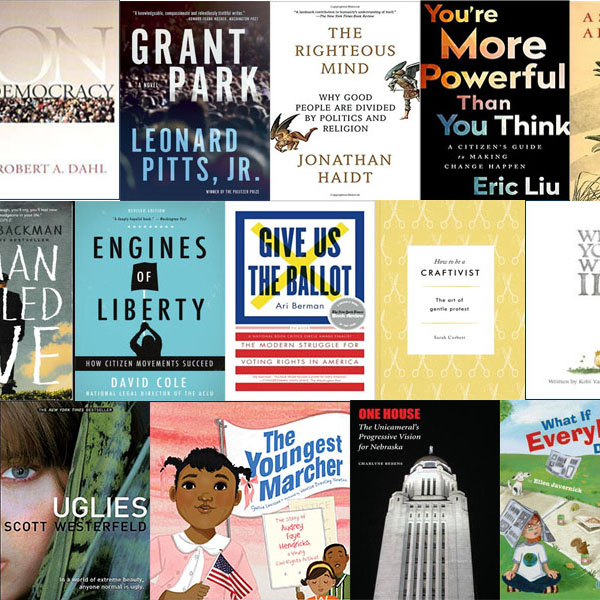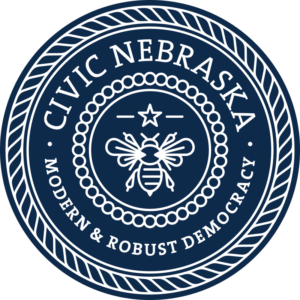
Earlier this summer we asked our staff, supporters, and the public to tell us about their favorite books to help us assemble our inaugural Summer of Democracy Reading List. We added just one qualifier: In general, the titles should highlight civic values, consider how to strengthen communities, or advocate for fundamental American rights. Then, we waited to see what would land in our inboxes.
And wow, did stuff land. So many of you answered our call for titles, we had dozens of thoughtful reading suggestions to consider – enough for three, maybe four full lists. Along the way, we earned the support of Lincoln City Libraries and the Omaha Public Library, which will feature Summer of Democracy Reading List displays at their various branches (Here’s the list in digital form for you online browsers in Omaha). We’re grateful to both organizations for partnering with us to help promote meaningful reading this summer.
So without further ado, here it is: Civic Nebraska’s 2018 Summer of Democracy Reading List.


The Righteous Mind: Why Good People are Divided by Religion and Politics
Jonathan Haidt
A useful work about how moral judgements that underlie politics and religion arise out of gut feelings, and how human cooperation can transcend those divisions. This fascinating and timely guide may be of interest to those struggling with the concepts of civility in a polarized nation.

On Democracy
Robert Dahl
A brief, straightforward summary of democratic theory. Dahl, a prominent political theorist, clarifies the definition of a modern democracy and lays the foundation for why they are so valuable. Extra bonus: It’s not dry or boring. Really, it’s not!

One House: The Unicameral’s Progressive Vision for Nebraska
Charlyne Berens
An examination of our state’s unique legislature — and a look at whether the promises that George Norris and his fellow unicameral promoters made have held up over the years (Official Civic Nebraska Disclaimer™: Berens, a retired professor of journalism at Nebraska U., presently serves on our organization’s Board of Advisors. But we’d recommend this submission even if she wasn’t).

You’re More Powerful than You Think: A Citizen’s Guide to Making Change Happen
Eric Liu
From the election of Donald Trump to the upending of the major political parties to the spread of grassroots movements like Black Lives Matter and $15 Now, people across the country and political spectrum are reclaiming power. Are we ready for this age of bottom-up citizen power? Do you understand what power truly is, how it flows, who has it, and how you can claim and exercise it?

Give Us the Ballot: The Modern Struggle for Voting Rights in America
Ari Berman
You’ve heard the one about how in the United States, all adults have been entitled to vote, right? It’s not — and has never been — that simple. In this speed history of the Voting Rights Act, Ari Berman discusses the historic legislation’s origins, its successes, and how the nation fundamentally was changed by its passage. He also examines the forces that have fought the law from its beginning.

The Dictator’s Handbook: Why Bad Behavior is Almost Always Good Politics
Bruce Bueno de Mesquita and Alastair Smith
In this provocative work, the author probes the power dynamics of leaders and politicians through economics, history, and political science. Bueno de Mesquita asserts that leaders how must stay in power by pleasing a core inner circle of power brokers, and that politicians must engage in self-interested behavior to stay in power.

Order Without Law: How Neighbors Settle Disputes
Robert Ellickson
Is social order possible without a strong government? Progressives and conservatives disagree. But in Order Without Law, Robert C. Ellickson’s answer is an unequivocal “yes.” People often benefit benefit from well-established social norms that have absolutely nothing to do with government. In many domains, Ellickson says, neighbors find efficient and mutually beneficial ways to cooperate and to settle issues — voluntary practices work to their mutual advantage.

The Givers: Wealth, Power and Philanthropy in a New Gilded Age
David Callahan
As socioeconomic inequality continues to accelerate, it’s important to consider what this means for democracy. Often, we polarize our society into the public and private realms, but there is a third sector – nonprofits and volunteers – building private enterprise for public purpose. Callahan explores how our wealthiest citizens are deploying their resources through philanthropy and often (but not always) doing great things. “It makes us think about the ways in which Americans should be participating if we wish to retain our voice as equal citizens,” submitter Joel writes.

A Sand County Almanac
Aldo Leopold
Here’s a classic submitted by Jordan H. of Lincoln. “There are two things that interest me,” Leopold says. “The relation of people to each other, and the relation of people to land.” How do we define community? What is the role of the individual? The collective? What are the ethics of interdependence? A Sand County Almanac, first published in 1949, remains a cornerstone of modern conservation science, policy, and ethics.

How to Be a Craftivist: The Art of Gentle Protest
Sarah Corbett
This book is about using crafts as a gentle form of activism, but it’s the overall idea of how introverts can find ways to still be activists and the potential power of a more calm form of resistance that is intriguing. “Gentleness is not weak, it requires self-control in the face of anger, injustice and sadness,” Corbett writes. “Gentle protest lets us have conversation instead of an argument, debate instead of shouting, and collaboration instead of opposition.”

Engines of Liberty: How Citizen Movements Succeed
David Cole
Some of the biggest Supreme Court decisions of the 21st century – marriage equality, the right to bear arms, civil liberties in the war on terror – have made modest societal forces into constitutional law. Justices’ votes are merely at the end of these stories, however. Cole notes that constitutional law changes slowly from the ground up, not suddenly from the top down. This book traces the choices, setbacks, and victories of dedicated advocates whose work brought us high-court rulings on gay marriage, gun rights, and checks on executive power.


The Uglies series
Scott Westerfeld
This young adult series is set in a future where people are separated by what the “ideal” life is, removing personal choice and preference by altering the chemical makeup of each person’s brain. The collapse of civic engagement has led to a world where no one is truly happy, while they are all distracted by an alternate reality of parties and overconsumption. A band of adults and kids uncovers the untruths of this society and fights to live as individuals – even if it is messy sometimes.

Little Brother
Cory Doctorow
Another young adult recommendation. Four teenagers in San Francisco who, in the wake of a terrorist attack on the San Francisco–Oakland Bay Bridge and the Bay Area’s public transportation system, see the Department of Homeland Security systematically attack the Bill of Rights. The teens, led by Marcus Yallow, use technology to thwart the the fictional DHS. Often described as “subversive” and “controversial” in how teens are depicted challenging authority, Little Brother also directly tackles themes of civil liberty and social activism.

A Man Called Ove
Fredrik Backman
A story about the importance of community engagement and our need for companionship, even if we are hesitant to engage. Ove doesn’t like most aspects of modern society but is eventually forced to interact with his neighbors in a small Swedish town. Eventually, he becomes connected to his neighbors, adventuring his way through tragicomical life changes.

Grant Park
Leonard Pitts Jr.
A novel that brings together history, journalism, racism, and politics. Grant Park begins in 1968 with Martin Luther King Jr.’s final days in Memphis, then flashes forward to the eve of Barack Obama’s historic 2008 election. Between the two eras, Pitts weaves a story between the novel’s two protagonists. On the eve of Obama’s election, a disillusioned news columnist and his editor clash, forcing them to recall their choices as young men, when their lives were changed by the civil rights movement. “That Pitts wrote (Grant Park) before the election of 2016 is noteworthy, because you’ll recognize where we are today and marvel at its prescience,” submitter Rita writes.


What if Everybody Did That?
Ellen Javernick
This lovely book illustrates the importance of being a good role model and citizen. When just one person does not respectfully participate in society, it may not be a big deal — but what if everybody did that? This book creatively illustrates the world we would live in if we did not take care of the world and one another.

Little Blue Truck
Alice Schertle and Jill McElmurry
A story of neighborliness turned partnership and how the little things can build a bigger picture. As the Little Blue Truck travels down the road, he takes time to acknowledge each of his animal friends. When a big truck with a bad attitude comes along and gets stuck in the mud, it seems that no one is willing to help — except for the Little Blue Truck. One extended hand of forgiveness allows for the whole ensemble to offer help.

What Do You Do With an Idea?
Kobi Yamada
A sweet narrative about the power of ideas. What Do You Do With an Idea? follows a child as he (she?) discovers the idea, nurtures the idea, and comes to realize that ideas change the world. This book is perfect for future community leaders and change makers.

The Youngest Marcher: The Story of Audrey Faye Hendricks, A Young Civil Rights Activist
Cynthia Levinson
A great choice for those with younger children who want to explore the civil rights movement and the Alabama Children’s March of 1963. Levinson tells the story from 9-year-old Audrey’s point of view, in a way that children can relate. The illustrations are filled with emotion and make it a great choice for a classroom or family read-aloud. The book provides just enough detail to spark quality discussion, unlike similar stories which can overwhelm or bore students with too many details or dates.

Further Reading
More suggested books from our staff, from our supporters, and from Nebraskans of all ages and backgrounds.
Pedagogy of the Oppressed, Paulo Freire ~ The Fire Next Time, James Baldwin ~ The Soul of America: The Battle for Our Better Angels, Jon Meacham ~ Fahrenheit 451, Ray Bradbury ~
Demagoguery and Democracy, Patricia Roberts-Miller ~ The True Patriot, Eric Liu and Nick Nanauer ~ Harry Potter and the Order of the Phoenix, J.K. Rowling ~ Master The Media: How Teaching Media Literacy Can Save Our Plugged-In World, Julie Smith ~ We Are The Ones We Have Been Waiting For, Peter Levine ~ The Work: My Search for a Life That Matters, Wes Moore ~ The Right to Vote: The Contested History of Democracy in the United States, Alexander Keyssar ~ Democracy: Stories from the Long Road to Freedom, Condoleeza Rice ~ On Democracy in America, Alexis de Tocqueville ~ Honeybee Democracy, Thomas D. Seeley ~ The Common Good, Robert Reich ~ A Higher Loyalty: Truth, Lies and Leadership, James Comey ~ Mockingjay, Suzanne Collins ~ Bowling Alone: The Collapse and Revival of American Community, Robert Putnam ~ The Trouble with Reality: A Rumination on Moral Panic in Our Time, Brooke Gladstone ~ Reclaiming Conversation: The Power of Talk in a Digital Age, Sherry Turkle ~ The Vanishing Neighbor: The Transformation of American Community, Marc Dunkelman ~ Heart of the Nation: Volunteering and America’s Civic Spirit, John Bridgeland ~ Children of Paradise: The Struggle for the Soul of Iran, Laura Secor ~ The Disaster Profiteers: How Natural Disasters Make the Rich Richer and the Poor Even Poorer, John C. Mutter ~ The Earth Is Weeping: The Epic Story of the Indian Wars for the American West, Peter Cozzens ~ Beyond the Corporation: Humanity Working, David Erdal ~ Bobby Kennedy: A Raging Spirit, Chris Matthews ~ Fascism: A Warning, Madeleine Albright ~ A People’s History of the United States, Howard Zinn ~ The Bully Pulpit: Theodore Roosevelt, William Howard Taft, and the Golden Age of Journalism, Doris Kearns Goodwin ~ Just Mercy: A Story of Justice and Redemption, Bryan Stevenson


